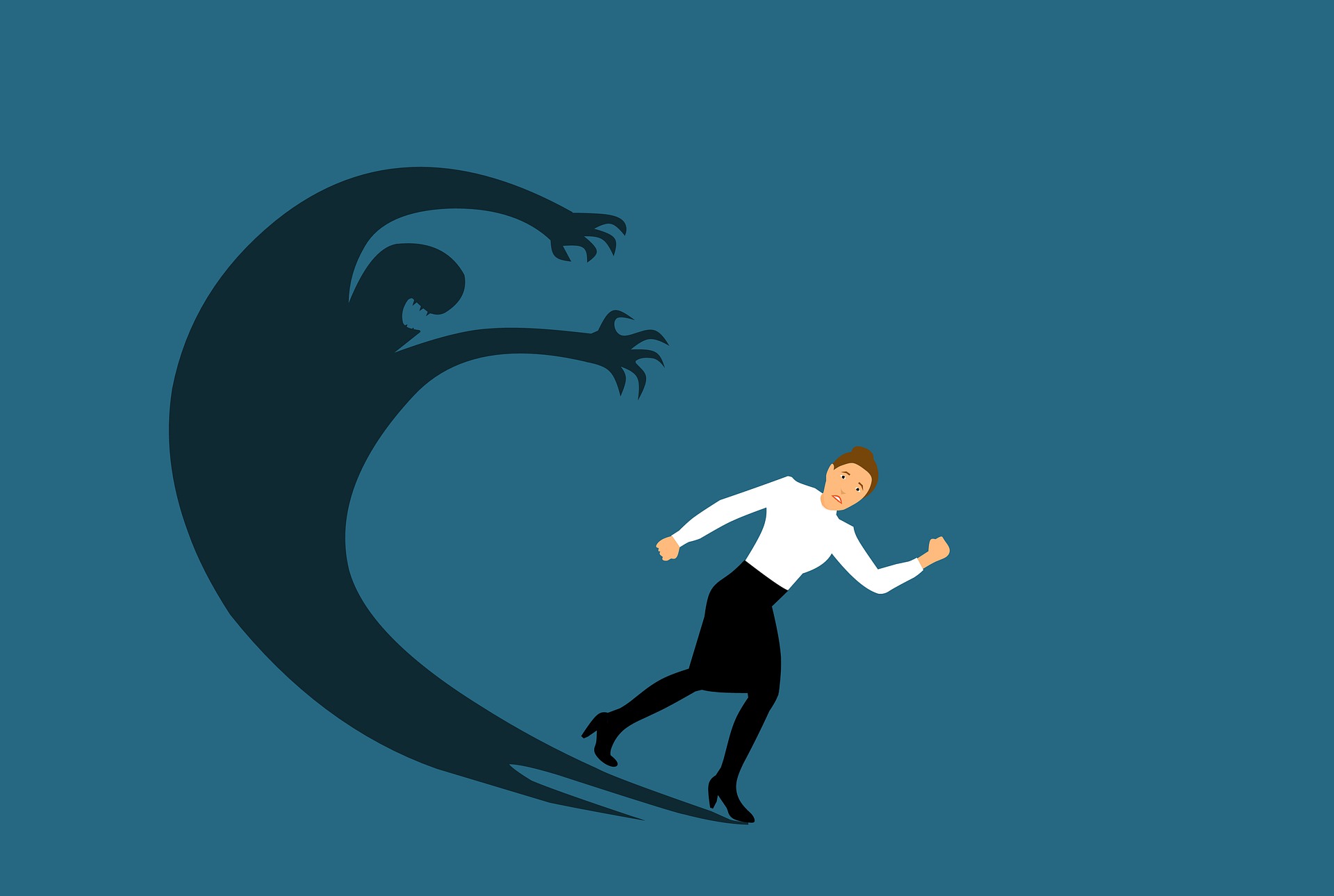5 Ways To Stop A Panic Attack Before It Happens
- Have you ever had a panic attack?
- Do you have strong feelings of anxiety and fear?
- Do you have panic attacks in your day-to-day life?
If you answered yes to any of these questions, this article can help you, that is, learning ways to stop a panic attack before it happens.
What is a Panic Attack?
What does a panic attack feel like? A panic attack is when a person gets a strong feeling of anxiety and fear. These attacks can be strange because they feel like they are happening for no reason.
Panic attacks hurt people not only mentally, but physically, as well. According to the APA, typical signs of a panic attack can cause a fast heart-beat, shortness of breath, chest pains, sweating, chills, trembling, numb hands, dizziness, nausea, and more. If you or a loved one has ever had a panic attack, you won’t be surprised to hear that the person may even feel like they are dying! To some extent, symptoms of a panic attack mimic those of a heart attack. In fact, some people may even go to ER because they thought they were having a heart attack when actually having a panic attack. Others may have panic attacks while in sleep, the nocturnal panic attacks.
How long does a panic attack last? Most attacks last a few minutes. Research showed that symptoms typically peak within 10 minutes and then begin to fade away. Some people reported longer attacks such as 30 minutes or hours long. In general, a panic attack is very uncomfortable and unpleasant, but not dangerous.
Luckily, some people may only have a panic attack a few times in their life. However, if you are someone who has these attacks a lot, you might have panic disorder. Panic disorder makes someone have many panic attacks. After the attack, the person can also have anxiety that lasts.
Why do I have Panic Attacks?
You may be thinking, “Why do I have panic attacks?” There are a few different answers to your question. Overall, panic attacks can be because of chemical changes in your brain, the way you grew up, your surroundings, other family members having these attacks, stressful life events, etc.
Regardless of why you have panic attacks, know that you are not alone! It can be very scary when you go through these times. Moreover, it may feel like you don’t have control over yourself and your body. Take comfort in knowing that there are ways to stop and cope with panic attacks.
How Can I Stop a Panic Attack?
Panic attacks could happen at any time and any place. For example, some people reported that they have panic attacks in public, such as at work, at school, on an airplane, or while driving. All these could lead to embarrassment and consequent avoidance of such places for fear that it could happen again. How to stop a panic attack before it even happens then?
First, Try Breathing and Relaxation to Stop a Panic Attack
It may sound simple, but breathing is very helpful in stopping your panic attack. Breathing methods can help you calm down when you are feeling your worst.
In our article, “How to Better Manage Your Anger,” we talk about a breathing exercise by Dr. Al Ubaidi. Similarly to a panic attack, when you have anger it feels like you are losing control of your body. Focusing on your breathing can help you calm down and get some of that control back.
In this exercise, the person is told to find somewhere comfortable to sit. Once seated, they are told to focus on their breath. People can imagine breathing out their anger. The same idea can be used for panic attacks. Try to imagine the fear leaving your body with every breathe you let out.
- 4-7-8 Breathing Exercise
This exercise is simple to do and easy to remember. If you ever get confused, look at the numbers in the title!
First, breathe out fully. Next, breathe in through your nose for 4 seconds. After, hold that breathe for 7 seconds. Finally, release that breathe for 8 seconds. Seems simple, enough right?!
According to Dr. Andrew Weil, this exercise helps you calm down your nervous system. He says people can use this method whenever and wherever they want!
- Guided Imagery Method
When you have an anxiety attack, you may want to run away from your feelings. Although it would be great to go on a beach vacation whenever you want, it sadly is not always possible. Especially in 2021, it feels like going to new places is very hard to do.
Luckily, we always have our imagination and minds to use. You could use your mind to go anywhere you want, any time you want!
In the Guided Imagery Exercise by Norelli et al., people can use their imagination to relax. First, find a comfortable place to sit. Next, imagine any place you would like! This can be your favorite childhood memory, your happy place, your dream travel spot, or anywhere else!
This exercise uses your five senses to relax. While using your imagination, really try and put yourself in the scene. For example,
- Imagine you are in your grandparent’s house on a sunny day.
- Pretend that you are looking at your grandma smiling at you.
- You hear the TV playing your favorite movie.
- You can feel their pet dog’s fur and smell your favorite meal being cooked.
- Finally, you are able to taste the food and eat dinner with your family.
Second, Use Mindfulness to Stop a Panic Attack
Mindfulness helps you to focus on the present moment and listen to your body. Mindfulness is to acknowledge that your thoughts and feelings are always changing. Therefore, you can learn to accommodate them with a sense of gentleness and acceptance. Meanwhile, mindfulness is about the process of focusing non-judgmental awareness thoughts, feelings, and sensations. That is, you strengthen your ability to observe them without identifying with or being defined by them.
In our article, “Simple Ways to Improve Your Emotional Regulation,” we talk about how mindfulness can help someone with their emotions.
When having a panic attack, you might feel like you are losing control over yourself and that your body is failing you! Mindfulness practices helps people escape their constant worries and bad thoughts. There are different ways to practice mindfulness:
How to Practice Mindfulness
You can practice mindfulness at any time. When you walk outside, cook, eat, clean, take a shower, take a test, or work out. Simply put, mindfulness is like “meditation on-the-go.” When you remain mindful, you live from moment to moment, instead of ruminating on the past or worrying about the future. Even if you have uncomfortable thoughts, you do not have to react upon them. By accepting their existence and letting them pass, you can develop a new response to fear and anxiety. With practice, mindfulness meditation can help you to create inner peace and less anxiety.
Mindfulness Meditation Helps to Reduce Panic Attacks
1. Guided meditation
This method can help someone feel a sense of calmness and peace. Guided Meditation is a meditation that is led by another person. In her video, Dr. June Cao helps listeners pay attention to their breathing, clear their minds, and feel more relaxed.
2. Practice Yoga
Yoga moves help you to center yourself and find peace in moments of stress. When practicing yoga, you focus your attention on your body movement and your breathing. Again, there is awareness and no judgment. Besides, Yoga postures help ease the physical discomfort and muscle tension caused by anxiety. Overall, Yoga for panic attack and anxiety has the best poses to calm you down.
3. Journal
It is mindful to put your feelings into journaling. Writing down what you are feeling can help you accept what is happening to you. Additionally, writing helps you to organize your thoughts rationally and naturally reduces your fear. When looking back at your past journal pages, it will remind you that you have been through this before.
Third, Be Your Voice of Reason.
In times of panic, it feels like the world is ending. Your mind is thinking about scary events, you are worried about what will happen to you, and your body feels upset.
Therefore, you need to remind yourself that you will be ok. For instance, it can feel like you are dying when you have a panic attack. Tell yourself that your body is fine, you will get through this attack, and that it will all be over soon.
Also, remember to be kind to yourself in these times. You are very strong and living with panic attacks isn’t easy. Be proud that you are able to go through these hard times and make it through!
This can also be a good time to look at your past journal pages. If you have a journal page that lists the way you were feeling when you had your last panic attack, it can be very helpful. These words show that you have experienced this attack before and you were able to survive it. Similarly, it can prove to you that you are not dying because you’ve felt this way before and nothing bad happened to you.
Fourth, Look Towards Support
Panic attacks can be very scary and make you feel alone in your fears. For this reason, it is important to lean on loved ones. Tell a trusted friend or family member when you are panicking.
Additionally, try finding support groups for people who also have panic attacks. This will help you see that there are other people who go through what you do. You can make friends and help support one another.
Fifth, Look Towards Therapy to Stop a Panic Attack
Talking to a therapist can help you with your panic attacks.
Exposure Therapy can help people who have panic attacks. When people have panic attacks, they can struggle doing daily tasks or even leaving their house – this can cause a person to have agoraphobia. This disorder makes people scared to be in open spaces, places they can not get away from, and more.
This therapy type helps a person face their fears. For example, some people may fear leaving their house. One part of their therapy can be to take a few steps out of their front door. Once they see that nothing bad happened, they will feel more calm. In time, they can try taking more steps.
One day, they will be walking down their block and beyond. Growth can take time but, in the end, it is so worth it!
Cognitive Behavioral Therapy (CBT) can also help someone with panic disorders. This therapy helps a person change their thoughts into healthier ways of thinking. When they worry about bad things happening to them, they can use what their therapist taught them to fight these concerns.
We want you to remember how strong you are! You deserve peace and happiness in your life. Mind Connections wants to support you! Our therapists can help to manage your anxiety in different forms. We provide psychotherapy like CBT and mindfulness as effective treatment for your panic attacks! Contact us free for 15-minutes. You do not have to suffer alone.
Content Creator, Victoria Gallo; Reviewed by Dr. June Cao
Special thanks to the contribution of our content creator Victoria Gallo





Wonderful blog! Panic attacks are simply ugly. Went to ER several times for that